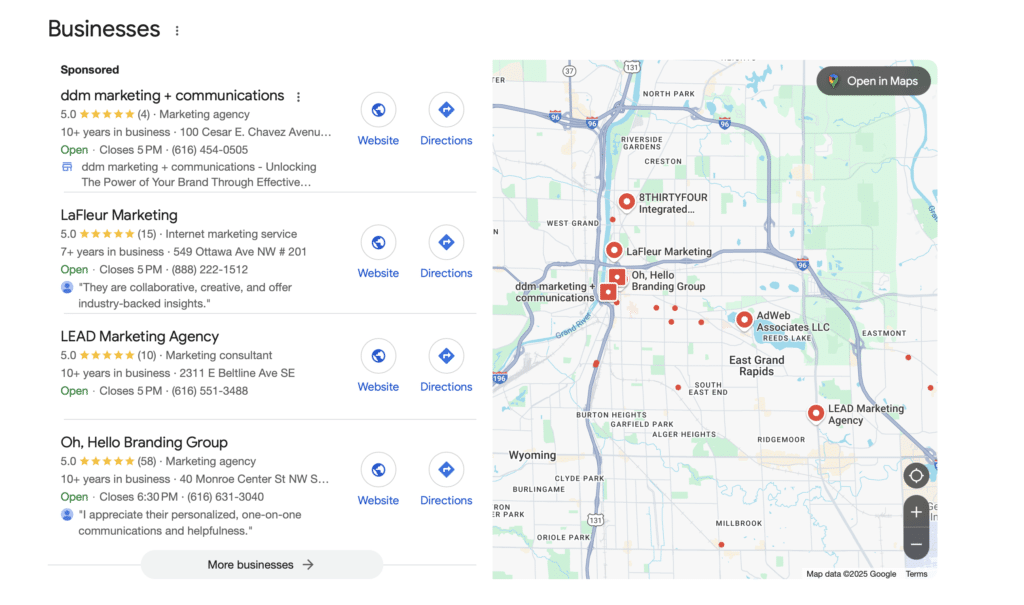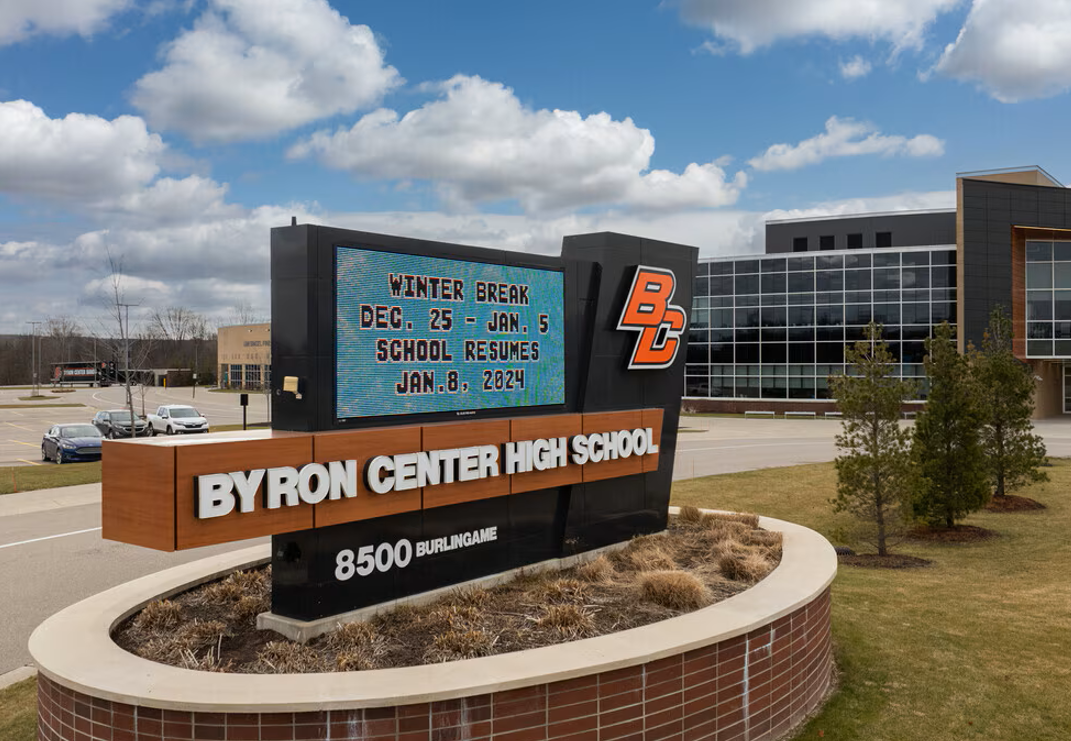Local SEO for law firms isn’t about convenience or vanity metrics—it’s about survival. In today’s hyper-competitive legal landscape, legal consumers don’t pick attorneys at random; they search with a very specific intent. They’re not casually browsing—they’re urgently seeking solutions. They need help now, and they’re looking locally. If you’re not visible exactly when and where these clients are searching, you’re effectively invisible.
Local search is the digital equivalent of having the most visible office on the busiest street in town. The firms dominating these searches don’t just collect clicks, they close cases. It’s as simple as this: if you’re not in the top results when someone searches “car accident lawyer near me,” your competition is. And they’re not complaining.
Understanding the interplay between your Google Business Profile (GBP), SEO (organic rankings) and PPC (paid visibility) isn’t just beneficial—it’s critical. SEO and your GBP are the long-haul game, building your firm’s credibility and organic ranking steadily over time. PPC, however, is your fast lane—putting you immediately in front of high-intent prospects. Firms winning at local search don’t treat these strategies as either/or; they expertly blend both to ensure continuous visibility and consistent growth.
What is local SEO?
Local SEO, or local search engine optimization, is all about making your law firm easily discoverable to people searching online in your geographic area. Since most law firms rely on local clients, local SEO can be a powerful tool to help you stand out.
When someone searches for a product or service nearby, Google typically shows a special set of results known as the “Local Map Pack,” which includes a map and local listings. Businesses optimized for local SEO are more likely to appear here, drawing immediate attention from potential customers who are ready to act.

Key elements of local SEO for law firms
Local SEO is your firm’s backbone online. It’s not just about ranking—it’s about establishing credibility and trust with Google and your potential clients.
Optimized Google Business Profiles
Local SEO for lawyers begins with your Google Business Profile (GBP), formerly known as Google My Business. This is your free business listing on Google that appears in Maps and search results. Ensure it’s claimed, accurate, and regularly updated. Keep your hours, address, phone number, and business details accurate and current.
Your should also regularly engage with your GBP through Google Posts (short updates you can publish directly to your listing), responding promptly to questions, and actively managing client reviews. Reviews, especially, play a significant role in your rankings and conversions. Encourage satisfied clients to leave genuine reviews, and respond professionally to any negative feedback. Remember, responsiveness demonstrates credibility and client care.
Not sure if you have the bandwidth to manage your GBPs? LaFleur’s local SEO services can ensure that your Google Business Profiles are accurate and engaging.
A note about Google’s Profile Strength Indicator
When you log into your Google Business Profile, you’ll see a circle in the corner that might be green, yellow, orange, or red. This Profile Strength Indicator gauges how well you are using Google’s system. While a red Profile Strength Indicator suggests you definitely could improve your Google Business Profile, don’t immediately panic if your indicator is yellow or orange.
We’ve had clients who are “orange,” but the only recommendations Google offers are to run paid ads or sign the business up for Google Workspace. These “optimizations” won’t necessarily improve your local SEO, but they will make Google more money. Always use your critical thinking skills when assessing Google’s so-called recommendations.
Localized content
While your GBP is core to your local SEO efforts, on-page optimization is also important. You should include city-specific keywords and locally relevant content throughout your website. Blogs, landing pages, and event announcements tailored to your local audience show Google you’re genuinely invested in your community.
Consistent NAP listings
Accurate NAP (Name, Address, Phone number) information across all directories is fundamental. Inconsistent listings confuse both Google and potential clients. Consistency builds trust and helps Google confidently recommend your firm.
Local links
Google loves backlinks, since they help demonstrate your expertise, experience, authoritativenes, and trustworthiness. Your law firm should try to acquire backlinks from local businesses, publications, and community websites. Local links show search engines that your business is trusted and relevant within your community.
Mobile-friendly websites
Most local searches happen on smartphones, so your website must load quickly and offer a great mobile experience to keep users engaged.
By investing in local SEO, you’re positioning your law firm directly in front of customers at precisely the moment they’re ready to engage or make a purchase. Done well, Local SEO can boost your visibility, attract more targeted traffic, and ultimately drive real, measurable growth for your practice.
Why reviews and social proof are essential for local SEO
Customer reviews and social proof play a critical role in shaping your online reputation and improving your local search rankings. Here’s why they’re so powerful:
- Influencing customer decisions: Online reviews directly impact purchasing decisions. Potential customers regularly read reviews to gauge whether your products or services meet their expectations. Positive feedback provides assurance, reduces hesitation, and encourages people to take action. According to Brightlocal, 38% of consumers will not contact a business unless it has a four-star rating or higher.
- Boosting search rankings: Google prioritizes businesses with strong, positive reviews, especially when determining which businesses appear in the coveted “Local Pack.” Regularly collecting authentic reviews can significantly improve your visibility in local searches. Research by Moz suggests that your review quantity and frequency (along with those star ratings) contribute to local SEO success.
- Building trust and credibility: Reviews act as digital word-of-mouth. Genuine testimonials from satisfied customers establish your brand as reliable and trustworthy, helping to differentiate you from competitors.
- Encouraging engagement: Responding thoughtfully to customer reviews demonstrates your commitment to customer satisfaction. Engaging with feedback, whether positive or negative, highlights your business’s authenticity and responsiveness, fostering stronger customer relationships.
To make the most of social proof, encourage satisfied customers to leave reviews on platforms such as Google, Yelp, Facebook, and industry-specific directories. Consider showcasing standout testimonials prominently on your website to amplify trust and credibility even further.
By strategically leveraging customer reviews and social proof, you not only enhance your local SEO efforts but also build lasting relationships with your community.
Should I run a review contest?
You should consider a few things before running a review contest.
- Your Rules of Professional Conduct: In some states, the Rules of Professional Conduct forbid compensating clients for positive reviews. You might be able to get around this by including all reviewers, whether they gave you a 5-star or 1-star review, in the raffle. But always check your state’s rules before running a client-facing contest.
- Google’s filters: Google’s algorithms are increasingly strict about fake reviews. You should avoid the appearance of review spam, like a sudden surge of reviews in a single day or all reviews coming from users without a profile picture. Also, don’t be alarmed if not every client review if published immediately. They might be going through Google’s filters.
Instead of rushing to get a bunch of reviews all at once, it’s generally better to nurture a steady, organic accumulation of reviews over time. (Email and marketing automation tools can help nurture your reviews. If you need help, let’s talk.)
On-page SEO and local keyword strategy: Think like your clients
While maintaining your Google Business Profile and other directory listings is essential to local SEO, don’t ignore traditional search and on-page SEO. On-page SEO refers to elements in your website’s content that help drive organic search results. Including keywords in your pages’ titles, headings, and content is critical to your website’s on-page SEO.
Keyword strategy isn’t about guessing—it’s about understanding exactly how your clients search. Keywords are the specific words and phrases people type into search engines when looking for services. If you’re working with a marketing agency, they are probably using research tools like SEMrush or Ahrefs to identify identify geo-specific, high-intent keywords for your site. If you’re trying to manage your keyword strategy on your own, target both broad terms (like “grand rapids personal injury lawyer”) and more niche terms (“grand rapids brain injury lawyer “) for a comprehensive strategy.
Expand this further by creating long-form, informative content around specific questions your potential clients ask. Blog posts or resource pages addressing these queries will demonstrate your authority and provide additional ranking opportunities.
Local content clusters: Beyond single keywords
Rather than targeting isolated keywords, develop content clusters around specific practice areas and geographic locations. A content cluster consists of a comprehensive pillar page (targeting a keyword like, “chicago divorce lawyer”) supported by related subtopic pages (like “child custody in illinois,” “high-asset divorce in chicago,” and “mediation vs. litigation for chicago divorces”).
This cluster approach signals topical authority to search engines and creates natural internal linking opportunities. Internal linking means connecting your website’s pages to each other in a logical way.
Technical elements that boost local SEO for law firms
On-page SEO gets a lot of attention, but technical SEO best practices will also help you appeal in the local search results. With technical SEO, you are structuring your website’s infrastructure to appeal to the search algorithms. For law firms, certain technical elements have outsized importance for local visibility.
- LocalBusiness schema markup: Implement comprehensive schema markup that includes your firm’s practice areas, operating hours, accepted payment methods, languages spoken, and service areas. This structured data helps search engines understand and display your firm’s details more accurately.
- Review schema: Properly implemented review schema can help your star ratings appear in search results, significantly improving click-through rates.
- FAQ schema: Adding FAQ schema to practice area pages increases SERP (Search Engine Results Page) real estate and directly answers potential client questions right in the search results.
- Semantic HTML structure: Using proper heading hierarchies (H1, H2, H3) and semantic HTML elements improves accessibility and helps search engines better understand your content’s organization and relevance.
- Local backlinks: Links from reputable, local websites and directories can boost your local authority. This might include links from non-profits and other organizations that you support or partner with in the community.
- Unlinked mentions: While they are not as powerful as backlinks, getting mentioned or name dropped by high-authority local media and websites can also improve your local SEO.
Investing in these technical elements creates a competitive advantage, as many legal websites still neglect these optimization opportunities. Need help improving your technical or on-page SEO? LaFleur’s SEO and development experts can help.
RELATED: Schema markup and SEO: A guide for professional service firms
Building a Strategic Local Backlink Portfolio
Not all backlinks carry equal weight for local search. Prioritize these high-impact link sources:
- Local bar associations: Membership directories and attorney listings from your state and local bar associations carry significant authority.
- Non-profit organizations that complement your practice areas: While backlinks should never be your primary goal, supporting non-profits that align with your practice or mission can confirm your expertise, experience, authoritativeness, and trustworthiness with the algorithms.
- Legal aid organizations: Volunteering with and securing links from legal aid groups signals community involvement and expertise.
- Local news outlets: Contribute expert commentary on local legal cases or issues to earn mentions and links from trusted news sources.
- Chamber of Commerce and business associations: Active membership in local business organizations provides valuable citation opportunities.
- Law schools and universities: Guest lecturing, scholarship sponsorships, or alumni involvement can generate authoritative .edu backlinks.
- Legal industry publications: Contributing substantive articles to respected legal journals and websites builds both authority and credibility.
Aim for quality over quantity—a single backlink from a relevant, authoritative site often carries more local ranking weight than dozens of generic directory listings.
PPC and LSAs: Fast track your presence on Google
SEO builds your foundation, but PPC and LSAs can deliver immediate visibility.
- Pay-per-click (PPC): Paid ads on search platforms like Google or Bing. You only pay for these ads when someone clicks on them.
- Local services (LSA): A pay-per-lead form of advertising when “Google Screened” firms appear in the search results. You only pay for these ads when someone converts by calling you or completing a form.
PPC (pay-per-click) and LSA (local services advertising) means you pay only when someone clicks on your ad in search results. Legal PPC can be expensive—yet highly profitable if managed well. Focus your paid advertising campaigns on the highest-converting, most profitable keywords and practice areas. Utilize call-only ads for mobile users, leverage Google’s Local Services Ads (LSAs), and continually test bidding strategies to optimize your return on investment.
Refine your PPC strategy by analyzing historical data and understanding the lifetime value (LTV) of your clients. LTV refers to the total revenue a client generates for your firm over the entire relationship. This data-driven approach helps you allocate budgets effectively and focus your spend on keywords and campaigns yielding the highest ROI (return on investment).
Local services ads and reviews
As in many forms of local SEO, reviews play a critical role in the success of your LSAs. Google is more likely to serve your ad—and rank it higher—if your firm has a strong review profile with a high average rating. Since LSAs prominently display your star rating, reviews become one of the first things potential clients see. For legal consumers, that visible feedback is often a deciding factor when choosing who to contact. Simply put, more high-quality reviews can mean better ad placement, greater consumer trust, and more qualified leads.
Geo-targeting and geo-fencing: Spend wisely, convert efficiently
Geo-fencing means creating a virtual boundary around a specific location where your ads will appear to people in that area. PPC geo-targeting ensures your budget is spent efficiently by showing your ads only to people in specific geographic areas. Identify and prioritize high-performing zip codes, and adjust bids based on location performance and peak conversion hours. This strategic approach ensures your ads reach the right clients at the right times.
Micro-local targeting techniques
Sophisticated geo-targeting goes beyond simple radius targeting:
- Zip code bid adjustments: Analyze case value data by client zip code and adjust bids accordingly. Often, certain neighborhoods yield significantly higher-value cases.
- Competitor proximity targeting: Increase bids for searches conducted near competitor offices to capture potential clients during their comparison phase.
- Geofencing opportunity zones: Create custom geofences around locations where potential clients may have immediate legal needs: courthouses, hospitals, police stations, correctional facilities, and accident-prone intersections.
- Demographic layering: Combine geo-targeting with demographic factors to focus on the most valuable client segments within specific locations.
- Public transit targeting: For firms in urban areas, target ads to appear during commuting hours for users near public transportation hubs.
These precision targeting approaches ensure your advertising budget is concentrated where it will generate the highest returns.
Tracking success: Measure, adjust, repeat
Effective local search strategies depend on continuous tracking and refinement. You should monitor GBP insights, local rankings, and organic traffic growth. For PPC, focus on metrics like cost per lead (CPL), cost per acquisition (CPA), and conversion rates. Regularly adjust campaigns based on performance data to continually improve results.
Utilize tools such as Google Analytics, CallRail, and Google Search Console to regularly review performance metrics. Leverage these insights to make informed decisions and adjust your strategies in real-time.
Beyond basic metrics: Advanced measurement frameworks
Leading firms implement these sophisticated measurement approaches:
- Attribution modeling: Move beyond last-click attribution to understand how different channels (organic, paid, referral) work together in the client acquisition journey. Attribution modeling helps you understand which marketing touchpoints deserve credit for conversions.
- Call tracking and recording analysis: Implement call tracking with AI-powered conversation analysis to determine which keywords and campaigns drive not just calls, but qualified consultations.
- Micro-conversion tracking: Monitor incremental steps in the client journey (downloading guides, watching videos, returning to the site multiple times) to optimize the full funnel.
- Competitor visibility tracking: Regularly audit competitor rankings, ad copy, and digital presence to identify opportunities and threats.
- Client value segmentation: Track which acquisition channels and keywords bring in the highest-value cases, not just the most cases.
- Cost per signed client: Go beyond cost per lead to measure the actual cost to acquire a paying client through each channel.
Implementing these advanced measurement frameworks transforms marketing from a cost center to a strategic investment with clear, demonstrable ROI.
SEO and PPC: Better together
SEO and PPC aren’t competitors—they’re partners. Use PPC insights to inform SEO content strategies. Leverage retargeting and remarketing to stay visible to prospects who haven’t yet converted. Retargeting means showing ads to people who have previously visited your website. Together, these tactics reinforce your visibility and authority, ultimately delivering sustained growth.
Regularly share insights between your PPC and SEO teams or vendors. High-performing PPC keywords and ad copy should inform your content strategy, while SEO-driven content can be used to test new PPC campaigns.
Consistency and precision win the local game
Local search success demands strategic consistency and precise execution. When you master the interplay of SEO and PPC, your firm won’t just appear at the top—it will dominate local searches, consistently turning clicks into cases. If you’re ready to elevate your local search game, we’re here to help you get there.
Ultimately, winning local search is about sustained effort, data-driven optimization, and an unwavering commitment to delivering clear value to your clients. Firms that embrace this approach don’t just survive—they thrive, turning their online presence into a powerful growth engine for years to come.
LaFleur: Local SEO services that get results
At LaFleur, the path to local search dominance isn’t mysterious—it’s methodical. We’ll begin by auditing your current position, identifying your highest-value practice areas and locations, and developing a prioritized roadmap for improvement. Then, we get to work, with the goal of generating qualified leads that become valuable clients.
Local search excellence isn’t about implementing a single tactic—it’s about creating a comprehensive system where each element reinforces the others. With strategic focus and disciplined execution, your firm can build a local search presence that consistently delivers growth for years to come.
Want to learn more about our approach, Let’s talk.
References
Mmeje, C. (2024, November 21). Local reviews & customer ratings [Google SEO]. Moz. Retrieved from https://moz.com/learn/seo/local-reviews.
Paget, S. Local consumer review survey: 2023. Brightlocal. Retrieved from https://www.brightlocal.com/research/local-consumer-review-survey-2023/#what-matters-to-consumers-about-online-reviews.





